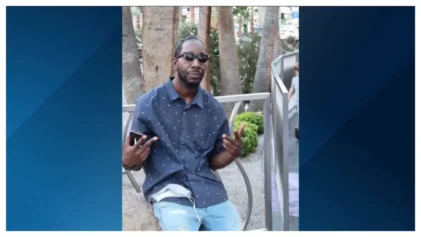
Anthony Huff died from complications of alcoholism, according to an autopsy. (Image courtesy of The Oklahoman)
An Oklahoma county sheriff and five others have been charged with second-degree manslaughter in the death of an inmate last year.
At a court hearing Tuesday, July 25, the state’s multicounty grand jury alleged that Garfield County Sheriff Jerry Niles and other jail workers were to blame for the unexpected death of Anthony Huff after they allowed the inmate “to remain in a restraint chair for over 48 hours without adequate food or water.”
Niles, 59, pleaded not guilty to the charges during his first court appearance this week, after which he was led away in handcuffs, The Oklahoman reported. His bail was set at $5,000.
The local sheriff now faces up to four years in prison and a $1,000 fine.
The other people identified in the indictments are detention officer/supervisor Shawn Caleb Galusha, 37, nurse Vanisa Jo Gay, 38, nurse practitioner Lena June Goatley, 57, assistant jail administrator Robert Markus, 29, and jail administrator Jennifer Niles, 34.
Records show that Huff, 58, was pronounced dead at the jail after officials found him unresponsive in a restraint chair on June 8, 2016. The Oklahoma man had been jailed four days prior on a public intoxication complaint and was placed in a restraint chair on June 6, 2016, after he began hallucinating, according to the newspaper.
An autopsy revealed that Huff ultimately died from complications of alcoholism. The Oklahoman reported that his estate later filed a federal civil rights lawsuit over his death. In the complaint, lawyers for the family argue that Huff “died due to conditions related to his withdrawal from alcohol and the effects it had on his body and system.”
The man’s estate is suing Niles Garfield County commissioners and others for actual and punitive damages, the newspaper reported.
“It is our hope and belief that justice will be served as those who have been indicted … for their involvement in this death now proceed through our criminal justice system,” Eddie Wyant, one of the attorneys for Huff’s estate, said following the grand jury’s decision.
Despite the lawsuit, Niles maintains that he didn’t violate the inmate’s rights “in any way whatsoever.”


